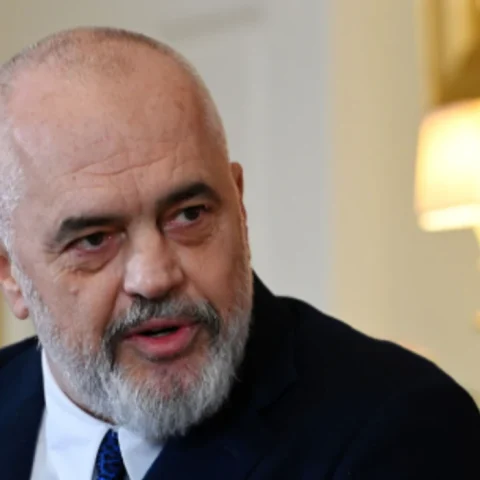A bolt out of the blue! Two hours after returning from an informal meeting of the FA Ministers of the Balkans in Macedonia, Besnik Mustafaj, Albania’s Foreign Affairs Minister made the public announcement that he had handed in his resignation to Prime Minister Berisha. In a clearly diplomatic style, the FA Minister justified his resignation by declaring that he was “exhausted by the intensity of work,” an argument which, to be fair, was difficult for the public to believe. With a courtesy equally diplomatic, Minister Mustafaj thanked Prime Minister Berisha for the confidence and cooperation he had extended, but implied that further cooperation was impossible and his resignation was irrevocable. However, beyond the diplomatic style, and of course it could not have been otherwise, – what is the substance of the resignation of the Foreign Affairs Minister?
First of all, it is obvious that the reasons behind this resignation have nothing to do with the substance of foreign policy. There is no stable argument that would lead one to believe that between PM Berisha and the FA Minister there was some sort of opposition or discord over the essence of Albania’s foreign policy. Although time and again a certain independence on the part of the FA Minister was reflected in actions or public statements regarding cardinal issues of foreign policy, this was nothing but an impression which is related to style and not substance.
It is difficult for a country such as Albania, and not just in a case like this, for the FA Minister to be independent from the government in issues of foreign policy. The substance and objectives in the foreign affairs of a country like Albania, and not just Albania, are not so dynamic. It can also be said that the substance of the foreign policy of Albania has never been and neither could it be different for the respective governments that have replaced one another in Albania these last fifteen years. Further nowadays Albania and similar countries are not so independent in their foreign affairs.
So if it is not contradictions and disagreement over the substance of foreign policy, then what was it that made Minister Mustafaj resign, if we take into account that the reason of “being tired” which he presented, is not completely relevant and credible.
There are a series of circumstances that suggest strong reasons for this abrupt decision of Minister Mustafaj. First of all Minister Mustafaj is one of the central figures of the Democratic Party, one of its founders, with an outstanding contribution during these fifteen years. His appointment to the post of FA Minister came after a lengthy career in the Assembly, in all the Legislatures. A former Ambassador of Albania to France during President Berisha’s first term in office, and during the 8 years of Opposition since 1997, Mustafaj was Secretary for Foreign Affairs of the DP. His appointment to the post of FA Minister was the easiest and safest to predict after the democrats came to office in the Summer of 2005.
However, there exists another set of circumstances apart from the above which make this resignation as unexpected and surprising as they do plausible. Besnik Mustafaj is a friend of very long standing of the Prime Minister and at the same time. From the other side Dr. Berisha is only link of Mr. Mustafaj with the DP. This friendship goes back several decades prior to coming together in politics and leading the Democratic Party. The enigma of the resignation of Besnik Mustafaj must be sought in the seemingly irreparable damage rendered this relationship. In short, there was obviously discord in relations between the Prime Minister Berisha and the FA Minister, which although not related to the substance of foreign policy, did have to do with the management of foreign affairs. It would not come as a surprise at all if it were the strong willed and almost usurping personality of PM Berisha that lies at the basis of the disagreements with the FA Minister, disagreements that have deepened, broadened to the point where they have eroded the relation of early friendship the two men had. In general, within the ranks of the DP, Besnik Mustafaj has been looked upon as an ‘outsider’ and several attacks against him, public or otherwise, launched by circles close to the PM could possibly have made Mustafaj reconsider his trust in Berisha.
Whilst it is more than obvious that these disagreements and contradictions were not related to Foreign Policy ‘ substance neither could these disagreements be linked to the performance of the diplomatic service, or the performance of Minister Mustafaj himself. And this is not only for the reason that PM Berisha ranked the FA Ministry as one of the most successful of the government. Mustafaj’s approintment to the head of the FA Ministry was both predicted and welcomed. During almost two years at the head of this Ministry, nothing spectacular has occurred in Albania’s foreign affairs, because, in theory this is not even possible. Nothing to invite reproach has happened either. In these modern times, foreign affairs are no longer a secret to the public, nor are they the domain of the one individual, whether PM or FA Minister.
The decision of irrevocable resignation from the position of FA Minister is, in essence, a dilpomatic, but final divorce of Mustafaj from Berisha.
This is suggested by the decision of irrevocable resignation, resignation which simultaneously has canceled Mustafaj’s official visit to the United States and an agenda fixed with Secretary of State Condelesa Rice.
From the side of PM Berisha as well, this seperation, although diplomatic, also has a ring of finality about it. Within a matter of less than 24 hours from the resignation of Mustafaj, the PM has appointed a new FA Minister.
Last but not least, resignation is quite a rare phenomenon in the modern history of the Albanian State. For almost a century under communism, there is only one case when a member of the government resigned. This was the case of Manol Konomi, the Albanian Minister of Justice in that time. During these last fifteen years, cases of resignation have been very rare and it would not be a mistake to say that the politicians of Albania still do not recognize it. Following the resignation of Ilir Meta, this resignation by Besnik Mustafaj is the second during these fiteen years. Very few. However it has begun to happen.
Resignation, the style and the substance

Change font size:









